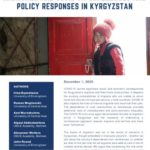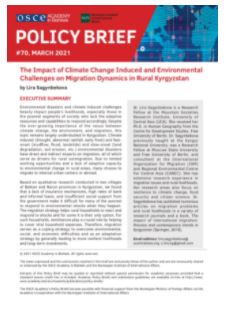In Kyrgyzstan, migrants move both internally from rural areas to Bishkek and Osh or abroad to countries such as Russia, Kazakhstan or Turkey for employment. Remittances from migration are critical for the economy.
The development of Kyrgyzstan reveals two important trends: declining agricultural production and a steady increase of remittances from labor migration. These trends suggest a transformative effect of migration, negating an overly–simplistic investment effect of financial remittances on long–standing livelihood activities. Although many studies agree that labor migration contributes to poverty reduction in rural Kyrgyzstan, little attention has been paid so far to the question: What effect does migration have on rural development? The Kyrgyzstan research and policy dialogue team are investigating this core question at the interface between migration and rural development policy. From this research they will develop key recommendations for stakeholders in both government and civil society.
Developing a unified migration policy for the whole nation is difficult, but answers to this question can help strengthen the ways in which government and key stakeholders link migration with regional development goals.
In response to the pandemic, AGRUMIG researchers and policy partners have conducted phone and socially distanced in-person interviews, and undertaken media analysis to understand the impact of Covid-19 on migrants in the country. Findings to date show that the public health crisis has decreased remittances and contributed to growing poverty, increasing vulnerabilities for migrants and demonstrating a need for stronger migration policy in Kyrgyzstan.
Contact point:
Asel Murzakulova, Senior Research Fellow, Mountain Societies Research Institute, University of Central Asia – asel.murzakulova@ucentralasia.org
Aigoul Abdoubaetova, Head of Research and Training Unit, OSCE Academy in Bishkek – a.abdoubaetova@osce-academy.net













